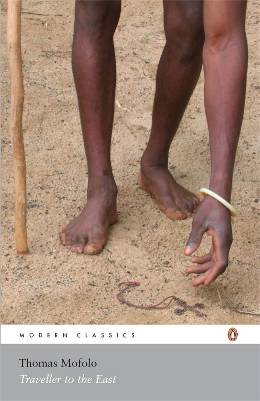But of course, I've been fickle Frannie again and chosen to blog about an entirely different book! Behold: Traveller to the East, or Moeti oa Bochabela, in the original Sesotho.

It's a short novel, just 88 pages long in a biggish font, serialised in a fortnightly newspaper to commemorate the 75th anniversary of the Paris Evangelical Missionary in Morija, Maseru. As you might have guessed from its cover and its provenance, it's a Christian tract.
But here's the humdinger: it was written back in 1907, making it possibly the first modern novel in all of Africa. Beat that, bitches.
I'm just gonna give you a plot summary here and now: it's about this young tribesman in distant times named Fekisi, fair in form, high in honour and skilled in battle, who is weary of the chaos in his village, where festivals cause drunkenness and violence, where his fellow herdboys are abused by older men and by others (no no, I meant that they hit each other with sticks; no sex in this book, not even with women, whom Fekisi shuns although they enter his scherm in vain hopes that he will court them).
He's inspired by the majesty of the rain, the legends of the heroism of the monster-slayer Kholumolumo and the martyrdom of the virtuous Sankatana, and the dream of Ntsoanatsatsi, the place of the rising of the sun. He's also given subtle spiritual comfort by his cattle, especially the white-faced Tsemeli and the grey-faced Tsoelia, to whom he addresses poetic hymns (making him a bit of Krishna-figure as well as a Christ-figure).
Then one day he's somehow able to call down the punishment of the heavens upon his evil neighbour Phakoane. And the experience disturbs him so much that he goes running off towards the East, towards Ntsoanatsatsi, non-stop without rest or food for several days, encountering more incidents that show him that to live is to suffer (at least in Africa, making him a Siddartha Gautama-figure as well), leaving Basutoland, eventually reaching the endless expanse that is the sea (you'll notice that Lesotho is landlocked), whereupon he meets three white men...
... who do not enslave him as in the slave-narrative of Caryl Phillips's Cambridge but instead take pity on him, nurse him back to health on a ship-voyage to Europe, offer him safe return to his homeland (which he refuses, as he desires only the divine), and teaching him CHRISTIANITY and also writing, by the way.
And then he reaches an unnamed European nation where all men follow God and he attends church on the day of the annual Great Feast and JESUS HIMSELF APPEARS and takes his soul with him in a cloud of smoke that staggers even the white priests.
You can see why I'm intrigued by this text. It's trippy, it's eludes all our postcolonial expectations, it blends nativism and Western doctrine almost seamlessly. It is blessedly heterodox, which is not what I expected of an incipient African text at all: I'd thought there'd be aping of the West, the same as there was in much of Asia when Modernism first arrived (cf. Mori Ogai, Ba Jin, Lim Boon Keng). Also, it uses the word "rhebok" to refer to something other than a shoe brand.
View Around the World in 80 Books!!! in a larger map
I'm still going to finish Nthunya's autobiography, mind you: just glad to have encountered this other text. Mofolo's more famous for his historical novel on the Zulu king, Chaka, by the way.
Representative quote: And here Fekisi our young man began to feel frightened and to wonder greatly. He asked himself, what is the sun which shines so brightly? By what or by whom is it guided on its journey from the East to the West? What is it held by that it does not fall to the earth? Where does it go and whence does it return and how does it go and rise again in the West? And what is this its heat which causes all vegetation to grow, and makes people and animals live? Because the sun is life itself, rain without the sun does no good, the sun is like the bread that we eat every day and by which we live, the rain is like meat, a thing of occasions only. And its strength, how great it is! Its warmth which gives life, its warmth like that of a sitting hen, when she warms the eggs so that chickens may come forth!
Next book: Neshani Andreas's The Purple Violet of Oshaantu, from Namibia.
1 comment:
mnkri90l2c
golden goose outlet
golden goose outlet
golden goose outlet
golden goose outlet
golden goose outlet
golden goose outlet
golden goose outlet
golden goose outlet
golden goose outlet
golden goose outlet
Post a Comment